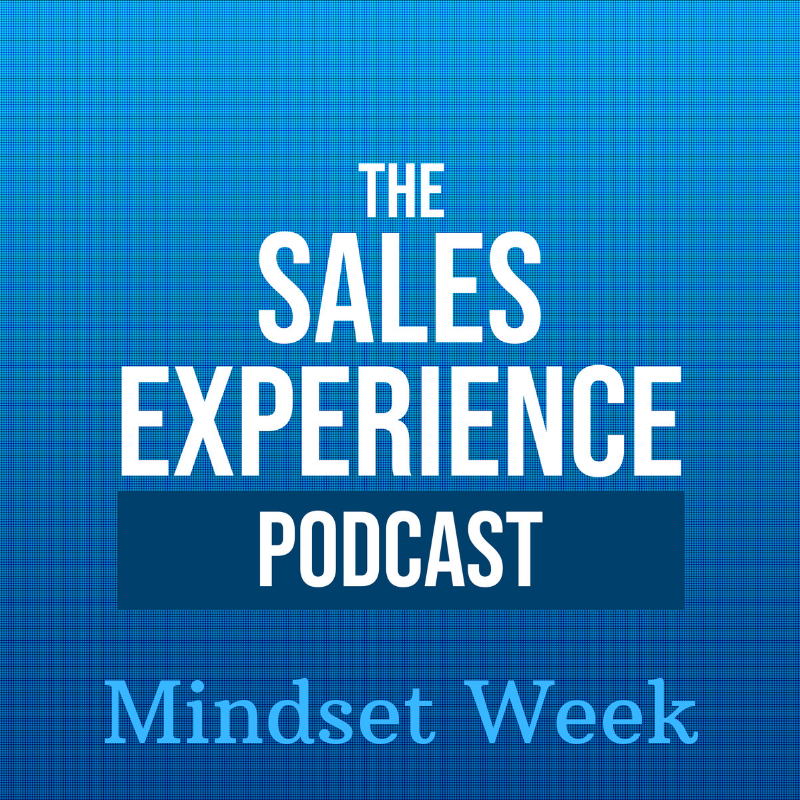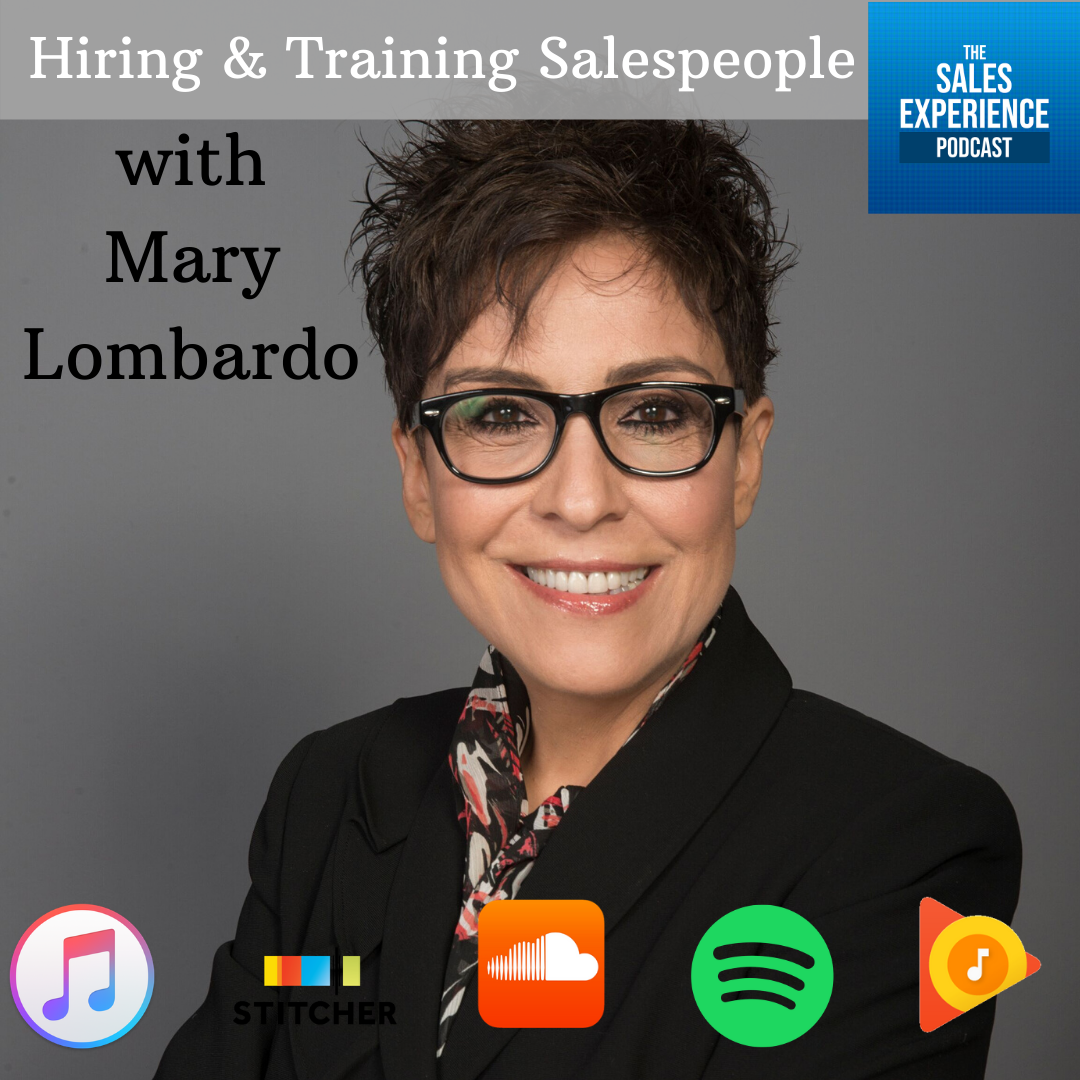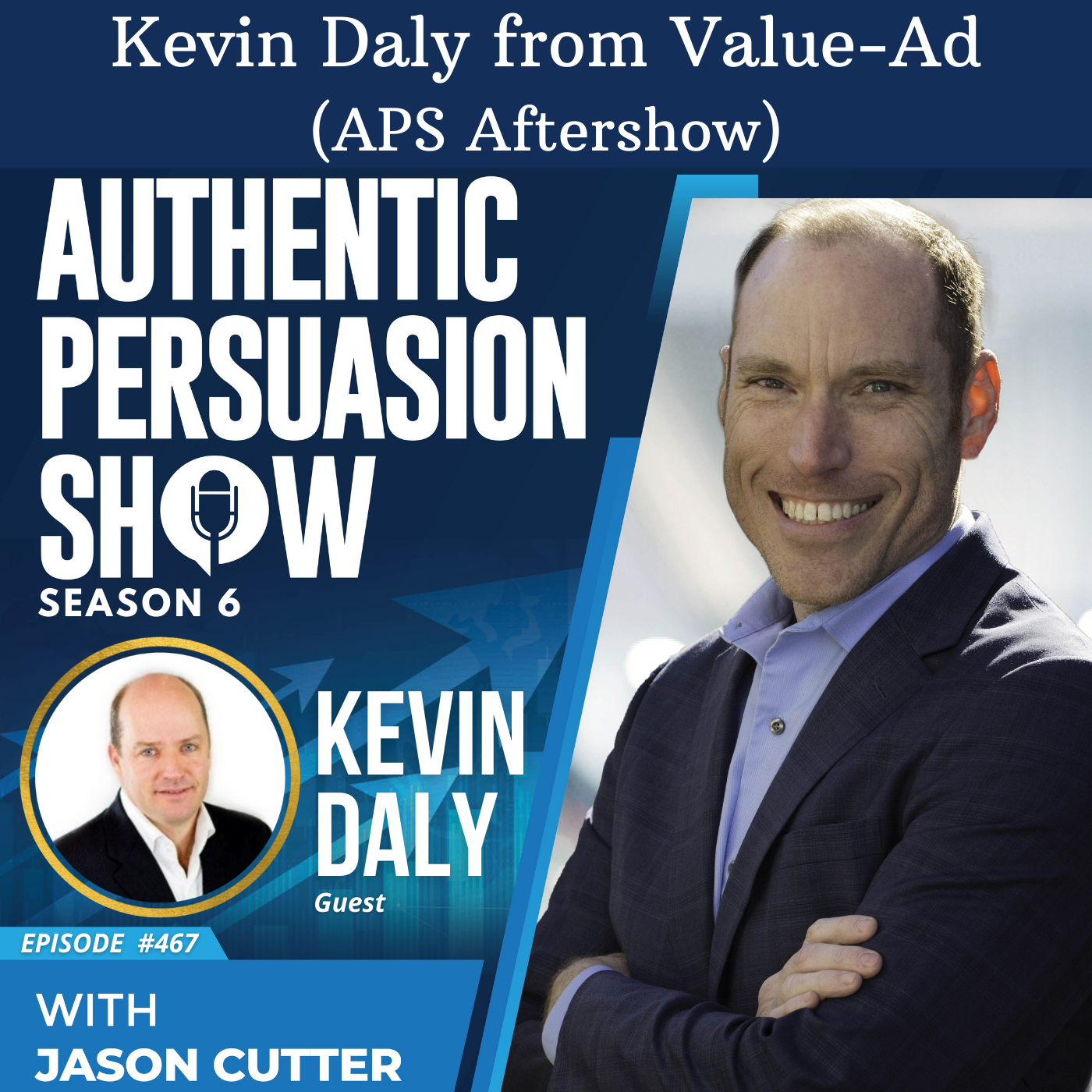Show Notes
Fourth and final segment of the conversation with Adam Honig from Spiro.AI.
More gems:
On Selling vs. Buying – “I feel like most buyers want to feel like they discovered it too!”
Using persuasion – “so that’s why the persuasion comes in, you know, because we’re all somewhat skeptical about the world.”
Download The Power of Authentic Persuasion ebook
Enroll in the Authentic Persuasion Online Course
Get help with your sales team
Connect with Jason on LinkedIn
Connect with Adam on Linkedin
Adam’s Bio:
Adam is passionate about helping companies make more money using artificial intelligence, and is the driving force behind Spiro’s pioneering new approach: proactive relationship management. As CEO, he is focused on the company’s overall market strategy and vision.
Previously, Adam co-founded a software company which he led through its successful IPO and sale. Afterwards, he founded Innoveer, one of the largest CRM consulting firms, which was successfully acquired by Cloud Sherpas (and then Accenture).
Where to follow Adam:
https://www.linkedin.com/in/adamhonig/
Links:
https://spiro.ai/resources/guide/infographic-not-your-fathers-crm/
https://spiro.ai/resources/guide/proactive-relationship-management/
E215 – Transcript
Jason: Welcome back sales experience podcast. This is part four. My final segment of the conversation I had with Adam. Hopefully you’ve enjoying all of it where we’re talking about CRMs and the processes and sales reps and managing and everything around kind of all of that part where we’re talking about success and this part here we’re going to address Adam’s feelings and experience based on what it takes to create that successful sales experience and then also what really good reps do in being effective and successful as salespeople. Here you go. Here’s part four. Enjoy.
Jason: When the economy changes, when things go down, when there is a shift and all of a sudden those opportunities in that tracking matter, then all of a sudden people will start to pay attention,
Adam: Well, I, you know, I’m a big believer in measuring step productivity, you know? So if you think about a very simple sales process from a lead to a qualified lead to a proposal or a quote to a win ratio, knowing exactly what the measures are and what you expect, you know, throughout that cycle. And then when you’re in a challenging sales environment, then you know, Hey, I better have 10 more leads if I’m going to make the numbers. Because if you don’t know what those percentages are, you’ll, I mean, you’re always gonna miss, you know, that’s, that’s my point of view.
Adam: You’ve got to know those because you have to have that baseline all the time. And for anyone listening to this, if you don’t know those stages, if you don’t know those numbers, especially if your reps aren’t using the CRM, which they probably aren’t, but you need to go back, even if it’s historical data and try to figure out those, you have that baseline of what success looks like. And then when things change or get difficult, you know, your business, the vertical competitors, whatever that force might be, you can’t just say, okay, well we used to close a hundred deals, now we close 50 right? Like we need to pump up marketing. Maybe that’s not the issue. Maybe it’s the people who are showing up for appointments or demos or the followup or sometimes companies will shotgun and just try to throw more stuff in all the buckets. But most often there’s one bucket or two buckets. The stages that are the issue.
Adam: We had that challenge at Spiro, we had a sales process challenge that we were winning the right number of deals. And so in terms of the proposals given out, that number was good, but we weren’t getting enough proposals out. But we were getting enough leads in and you know, kind of the, the breakthrough for us was realizing that we weren’t doing a good enough job really surfacing customer pain and we were spending too much time talking about us, you know? And, and for some people where the solution just boom, matched up perfectly with what they needed, it went right through and that was our win and then everybody else was like, yeah, I dunno. You know? And so we weren’t kind of getting to that, helping people understand how Spiro can solve their problems step, which is what was required to get the quote percentage off. So yeah, I would definitely keep a close eye on those ratios, especially the economy goes up and it goes down. I mean it’s all over the place. So I would definitely, if sales leadership were to ask me probably the number one thing that they should be doing, paying attention to those metrics in this kind of situation.
Jason: 100% and I love the, in your honest sharing, talking about, you know, where you guys were having an issue and it brings up something I try to mention all the time and it’s something I see that’s a constant factor with companies and or sales reps that are struggling, which is where literally they’re just talking about themselves the most, right? They think what they have. It’s either two sides. One is it’s awesome and it’s cool and it’s innovative. They just want to talk about it because it’s amazing, right? Like I could see that from your perspective. Or there’s reps on the other side, which just literally they’re not paying attention or they’re making it all about their own ego and they’re just sharing it. If you’re in sales, nobody cares what you do. They want to know what it’s going to do for them. Right?
Jason: And what you’re saying is those like easy lay down ones and that’s where, you know, I, I use the term a lot that I’ve seen is order takers, right? Order takers type sales reps can do all kinds of things wrong in a sales process. Still close a certain amount of deals because there’s some people who you’ll talk to that’ll be like, yeah, I get it. I want it. Here’s my credit card, let’s go. But usually you can never hit your quota. You can never make enough sales or money by that approach. So I’m glad that you said that and brought it up and that you guys recognized it and then made the shift more discovery, I’m sure.
Adam: Yeah, totally. We totally redid our discovery process and focused on what we felt like were the key pain issues that customers would need to have to be a good fit for Spiro. That was a key exercise that we went through. And I have to say since we did that, everything has kind of gone back to the where I expected it to be. So, you know, I feel like, Oh, okay, well gosh, we, we got, uh, we did okay on that one.
Jason: Well, and what’s fascinating to me and this human behavior wise is if you’re selling something that requires a lot of education, right? So let’s talk about you for example, in Spiro. So most people know what a CRM is, right? So anyone in sales management leadership, they know what a CRM is. They probably know they should be using one. Like you don’t have to educate them on what a CRM does, but you guys have to educate people on why you’re not a CRM and what it does differently. And there’s this learning curve, this education piece. There’s more information you have to share. The standard thing I see is that a lot of people, when they feel they have something that people won’t know about, that they have to educate, they lead with that education. The problem is that you can tell people about it.
Jason: They still don’t know how it affects them. And so the actual response is the more innovative and learning curve and information is required for someone to get what you do and why you’re different in my experience is the least you need to talk about it up front because you really want to know how to then apply it. Like if I tell you I have the solution for you, I want to know your problem and then tell you, okay, so based on your problem, here’s what it does for this thing and this thing and this thing and here’s how it makes your life better. But most people default to the more that they feel like they have to educate people, the more they educate and use long monologues and people don’t care.
Adam: I’m with you on 200%. I feel like most buyers want to feel like they discovered it too. Yeah. You know, so like they want to feel like they basically kind of invented it, you know, to the point. And so we have a, in our discovery process, which I love, which is basically saying, well based upon everything we’ve talked about, just imagine you had a million engineers that could write some software for you. What would it be like? You know, just tell me about that. And this is before we’ve told them anything about Spiro. It amazes me that most of the time they kind of say all of the things that we do. And then we’re like, okay, well it seems like we might have a good fit here. Let me tell you a little bit about us, you know, so.
Jason: And if you can unlock that for people, for your customers, you know, for everyone listening to this, if you can use those kinds of questions, get people thinking about it and come up with like, if you could do this, if you could have built it, what would it have done for you? Right. And then those people, obviously not everyone’s going to be thinking in that realm, but anybody who is, if they’re thinking about that, then that’s a home run product market fit for that group. Assuming they don’t then think, Oh wait a second, I could just build this myself. Which is the rebuttal sometimes to that.
Adam: Yeah. Well, that’s fine. They can go build their own Spiro for them and you know, I’ll license it from them cause it, we spend about 9 million bucks doing it. So if they can do it cheaper, I’m good on that.
Jason: And that kind of customer, you know, in my experience doesn’t make for a very good customer anyway because they’re always going to think they could have done it better. So those are in that category of people, I’m, I’m happy to not sell or have my reps sell to the ones who just think they can do it better themselves. We’re going to go try like give it a shot.
Adam: Yeah, for sure.
Jason: In that process, one final question I have is in your experience, because you’ve seen a lot of sales reps, right? This is not CRM related question, what do you attribute successful salespeople to doing or being, or having that really makes them successful?
Adam: Well, it really has to be a mix of things. You know, salespeople need to have the persuasion that you mentioned before to get people to connect the dots between what their pain or need is with, you know, how we can help them. And it can be hard for prospects to really listen to that. And so that’s why the persuasion comes in, you know, because it’s, you know, people, we’re all somewhat skeptical about the world. And so, you know, if somebody comes to you and says, Hey Jason, I’ve got this great idea, blah, blah, blah. You’re like, yeah, right. So you need to be really good to navigate that part of the sales process. But if you don’t have the ability at the beginning, the front end of it really understand and listen well, it’s not gonna work either. So there’s kind of both listening and persuading component to it. And that’s really tricky because often people are really good at one, but not the other. So how do you marry the two of those together?
Jason: Yeah, I think that’s a great observation. I mean, the fundamental thing that you’re running up against with pretty much every prospect that doesn’t have their credit card in hand is that people want to stay in their comfort zone and they, and change is scary, right? Change equals death. And so what if they buy and they shouldn’t then, so you’ve really got to make it relevant to them and why it’s a safe decision, which like you said, like asking questions, listening leads, that persuasion part. And it is fascinating, the number of people I agree with, I’ve seen just like you where they can do one or the other, right? They can persuade, but it’s just so misguided and terrible that it’s like the wrong direction or not based on facts. It’s just all fluff. And then there are the people who can ask and can listen and know everything about that person. And they now have new Facebook friends and they share their favorite restaurants and all of that stuff and they’re crying on each other’s shoulder, but literally no sales.
Adam: Right. So, yeah. Cool
Jason: Yeah. Cool. Well, um, where is the best place for people to find you? To find the technology to, you know, engage in this kind of you and, or your pursuit of, uh, killing CRMs
Adam: I mean, I definitely would encourage people to connect with me on LinkedIn. So I’m just Adam Honig on LinkedIn with Spiro. It should be pretty easy to find. There are some other guys named Adam Honig, but I usually come up first. So you know, of course, I’m on Twitter. Uh, and if you know, if companies or salespeople are interested in learning more about basically it’s CRM that nobody needs to use. I mean you can always check out spiro.ai. We’ve got the fancy artificial intelligence domain name there. Yeah, exactly. So in Spiro, by the way, we named the company after the Latin words Ferrari, which means to breathe. So it’s our mission to breathe new life into this really terrible piece of technology that we’ve been talking about today. So hopefully that’ll help people keep it in their mind. Oh, the Latin scholars out there.
Jason: There we go. That’s they probably already thinking that already. Well, and I appreciate you and kind of this mission, cause one of the things I see, right? CRM is a great tool for management when it’s done right. It’s usually not something like you on what you’re working on in your mission. So take that piece away from salespeople. When it’s done properly, it will allow salespeople to focus on what they should, which is the right prospects and the right sales experience and moving the right customers forward and doing that at scale. So, you know, I see that as a great thing to help hopefully improve the world of sales, the right salespeople in the right direction. So I appreciate it and thanks for being on the show and talking about CRM and hopefully everyone actually tuned all the way through with our warning about this conversation not being about CRM usage and beating reps for that. So thank you for being on the show.
Adam: Yeah, my pleasure.
Jason: Cool. And for everyone listening, if you want to check out the rest of Adam’s links and also the transcript from these episodes, you can go to cutterconsultinggroup.com/podcast as always, keep in mind that everything in life is sales and people remember the experience you gave them.
![[E215] Proactive Relationship Management with Adam Honig – Part 4 of 4](https://episodes.castos.com/salesexperiencepodcast/images/TSEP-Adam-Honig-Cover-Image.png)


